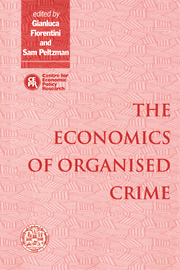Book contents
- Frontmatter
- Contents
- List of figures
- List of tables
- Foreword
- Acknowledgements
- List of conference participants
- 1 Introduction
- PART I THEORIES OF THE STATE AND THE ORIGIN OF CRIMINAL ORGANISATIONS
- PART II THE CRIMINAL ORGANISATION AS A FIRM
- 4 Internal cohesion and competition among criminal organisations
- Discussion
- 5 Conspiracy among the many: the mafia in legitimate industries
- Discussion
- PART III ORGANISED CRIME AND STATE INTERVENTION IN THE ECONOMY
- PART IV DETERRENCE POLICIES AGAINST LEGAL FIRMS INVOLVED IN ILLEGAL ACTIVITIES
- PART V DETERRENCE POLICIES AGAINST ORGANISED CRIME
- Index
Discussion
Published online by Cambridge University Press: 04 August 2010
- Frontmatter
- Contents
- List of figures
- List of tables
- Foreword
- Acknowledgements
- List of conference participants
- 1 Introduction
- PART I THEORIES OF THE STATE AND THE ORIGIN OF CRIMINAL ORGANISATIONS
- PART II THE CRIMINAL ORGANISATION AS A FIRM
- 4 Internal cohesion and competition among criminal organisations
- Discussion
- 5 Conspiracy among the many: the mafia in legitimate industries
- Discussion
- PART III ORGANISED CRIME AND STATE INTERVENTION IN THE ECONOMY
- PART IV DETERRENCE POLICIES AGAINST LEGAL FIRMS INVOLVED IN ILLEGAL ACTIVITIES
- PART V DETERRENCE POLICIES AGAINST ORGANISED CRIME
- Index
Summary
Polo's paper offers us an explanation of criminal organisations’ hiring decisions and of the consequent pattern of ‘colonisation’ of a population of potential affiliates who are uniformly distributed along a bounded one-dimensional continuum. The perspective he adopts is that of (optimal) contract theory. Illegal organisations are characterised as institutions based on contractual relationships that cannot be enforced by an external, super paries, legal authority. On the other hand, the set of feasible actions available to an illegal organisation is not limited by legal restraints. It can (and typically does) include the use of brute force, not excluding lethal violence, as a viable alternative to legal enforcement: rather than sueing affiliates that violate contractual obligations in court, the illegal organisation threatens to punish them to an extent that depends on the available deterrence power (as determined by the organisation's ‘military’ technology).
As to potential affiliates, they are assumed to be opportunistically motivated: as soon as there is a clash between their own and the organisation's interests, they are assumed to pursue the former at the expense of the latter unless this option is made unattractive by the organisation's imperfect but costless deterrence power, which is assumed to be stochastic and decreasing (on average) with the affiliate's distance from the organisation's seat.
Within this framework, Polo proves that, when there is only one organisation on the stage and contracts have infinite duration, it is optimal for it to threaten the hardest possible punishment against defectors (it is costless anyway) while offering wages for a given task that are increasing with the affiliate's distance (in order to compensate for the decrease in deterrence power).
- Type
- Chapter
- Information
- The Economics of Organised Crime , pp. 109 - 115Publisher: Cambridge University PressPrint publication year: 1996



